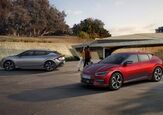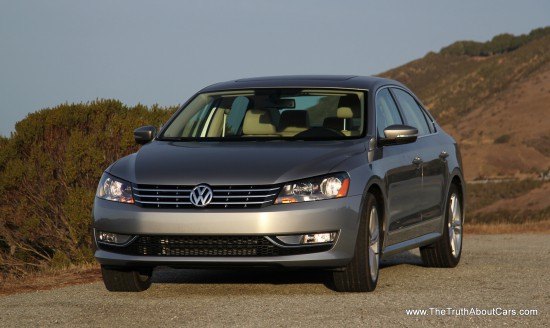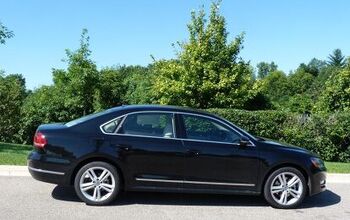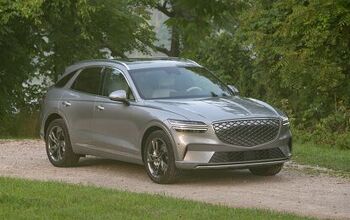Review: 2014 Volkswagen Passat TDI (With Video)

Once of the most frequent car advice emails I get is from consumers looking to cut down their fuel bills while still hanging on to a family sedan. Until recently, this question narrowed the field down to a few hybrid sedans and the Volkswagen Passat TDI. Today, there are more hybrid options than ever and soon Mazda’s diesel powered Mazda6 will enter the fray. While we wait for the Mazda’s new SkyActiv diesel to ship, I picked up a Volkswagen Passat TDI to find out if a little diesel could bring some cost reduction to my commute.
First off we have to dispense with the fallacy that buying a new commuter car will save you money. Of course we all know that is rarely true, especially if you are simply replacing one family sedan with another. (This disclaimer is just for the readers that may object to the forthcoming cost savings comparisons.) Second you must think about what kind of driving you do before you start looking at technologies to reduce your gas bill. If your commute is highway heavy, then a diesel or amvery efficient conventional vehicle may be the better choice for you. If your commute is balanced between highway and city or city heavy, then many hybrid technologies may be the winner.
Exterior
While other VWs get expressive fascias, VW’s sedan line is pure conservative German design. We have a three-slat horizontal grille up front, a flat character line and little detaining on the side and nothing terribly expressive out back. The adjectives that came to my mind were simple, elegant, and unemotional. No matter how you park it, the Passat never strikes a pose that would offend a conservative mid-size shopper.If you want Euro flair, VW would be happy to sell you a CC which sports more aggressive bumpers, more chrome and sexier tail lamps. However the Passat TDI is competing with the hybrid versions of the Fusion, Camry, Accord, Optima and Sonata, as well as the “we hope its not a mirage” Mazda6 diesel. While some in the press have called the Passat boring, I would posit the sedate lines will help the Passat age more gracefully than some of the competition, most notably the Sonata and Camry, however I think the Fusion and Mazda6 are more attractive and dramatic.
Interior
Sadly Camcord shoppers place fuel economy, electronic doodads and rear-seat leg room higher on their list than squishy dash bits and VW was happy to oblige. As a result the Passat’s plastics are attractive to look at but just as mainstream to feel as the competition slotting in below the new Accord and well ahead of the aging Korean competition. Speaking of attractive, I find the traditional “single bump” dashboard layout to be a refreshing change from the massive dashboards that are creeping into every mis-sized sedan lately. Front seat comfort proved excellent for long car trips, tying with the Accord and Fusion while the rear seats, although large, weren’t as comfortable as Honda’s sedan.
Infotainment
Because there is no “S” trim Passat TDI, base diesel lovers get a slight feature bump compared in the infotainment department. The base 6.5-inch touchscreen system is joined by 8-speakers, HD Radio and standard Bluetooth for a decent base package. The systems iDevice and USB integration offers no voice commands like you find in most of the competition, but it is reliable and intuitive. VW offers two different navigation systems depending on how far up the trim ladder you want to walk. SE models with the sunroof can get the “RNS-315” which uses a 5-inch touchscreen and very basic navigation software.
Jumping up to the SEL model adds a Fender branded speaker package and a 6.5-inch high resolution navigation system with satellite radio and Sirius Travel Link live traffic and information services. While most of the information is superfluous, the fuel pricing and locations proved handy as locating a diesel station can be tricky. The traffic and Travel Link features require a Sirius subscription and VW tosses in a 6-month trial for free. Sadly VW’s navigation systems predate the 2012 Passat refresh by a decent window and are among the oldest and least feature rich in the mid-size sedan segment barely scoring a win over the ancient system in the Chrysler 200. You won’t find smartphone apps, slick graphics and VW has even reduced the number of voice commands the system can recognize because the hardware was unable to handle it with reasonable performance. With Toyota and Honda recently launching their new infotainment systems and Ford’s MyFordTouch system getting a much needed refresh, this puts VW in next to last place, just in front of the dreadful navigation system lurking in the Mazda6.
Drivetrain & Pricing
Powering the Passat is the same 2.0L turbodiesel found under the hood of every diesel VW in America except the Touareg. The small diesel engine features twin cams, 16 valves, aluminum head, iron block and a variable geometry turbocharger to deliver 140 horsepower and 236 lb-ft of torque. Funneling the power to the front wheels via a 6-speed dual-clutch automatic, the Passat doesn’t feel as slow as 140 ponies might suggest. The gasoline electric hybrids on the market are peppier, with the Camry delivering 200 ponies, with the Optima and Sonata nearly tying at 199, while we get 188 from the Fusion and 166 from the Accord. Normally, the high torque is a bonus when you compare a TDI to a small gasoline engine. However, modern hybrids deliver diesel-like torque with flat torque curves thanks to their electrification. The Koreans serve up 235 lb-ft and the Accord cranks out 226 with both curves being more advantageous than the TDI. Ford and Toyota do not release official torque numbers, but I suspect they are both in the 220-230 lb-ft range.
Because of tightening emissions regulations in California, the Passat now comes with a urea injection system also known as “diesel exhaust fluid” or DEF to reduce NOx emissions. This is a significant difference from Mazda’s new SkyActiv diesel engine which they claim does not require this additive to achieve the same emissions compliance. This is significant not only because owners won’t have to buy DEF every few thousand miles, but also because VW decided to put the DEF filler port in the trunk rather than by the fuel filler on the side of the car (like other manufacturers do.) The result is an inconvenience on the VW side and, according to Mazda, a power bump on the SkyActiv diesel which they expect to come in around 170 ponies (if we get the high-output version) and 300 lb-ft of torque which should put the Mazda neck-and-neck with the hybrids.
The Passat TDI starts at $26,295 for the SE trim and tops out at $32,995 for the loaded SE. This price walk essentially mirrors the Passat V6 and feature for feature is substantially similar to the Camry, Optima, Sonata and Fusion hybrid sedans meaning the TDI doesn’t have a price advantage initially compared to the gas-electric competition. Honda’s Accord Hybrid starts at $29,155 making it the highest base price in this bunch, but the top-level Accord at $34,905 seems reasonable compared to a fully-loaded Fusion Titanium Hybrid at $38,870.
Because the mid-size sedan segment is so competitive, when you calculate the value of standard feature content, most of the pack ends up within a few hundred bucks of one another except for the Optima which undercuts the pack by nearly a grand. The higher top-end pricing on the hybrid competition is largely due to the availability of more features like radar cruise control, self parking, lane departure prevention that you won’t find on the Passat.
The Americanization of the Passat has had an effect on the way VW’s large sedan drives. The difference is most obvious if you drive the VW CC and the Passat back-to-back. The CC has a more solid and connected feel and the handling limits are higher. That’s not to say the Passat will let down the VW faithful with Camry-levels of grip, but in the pursuit of higher fuel economy narrower tires we required. In the pursuit of rear leg room, the wheelbase and chassis had to get longer making the American sedan drive larger than the European model. The result is a Passat that slots below the Mazda6, Accord Sport and some levels of Fusion in terms of handling, but notably above the Camry and Korean competition which have less refined suspension manners.
Diesels have never been known for spirited performance despite the modern crop of torque-strong turbocharged designs. Our TDI tester clocked 60 MPH in just over 8 seconds which is on the long end of the green pack with most of the hybrid competition in the low to mid 7 second range. Diesels have a dedicated following largely due to their high fuel economy, high torque numbers and the plateau like horsepower and torque curves. Today’s hybrids however deliver much the same experience thanks to electric motors that deliver their maximum torque at low speeds without the turbo lag experienced in turbo Diesel engines. This negates many of the claims popular in the TDI forums.
Once upon a time when Toyota’s unique planetary gearset power-splitting hybrid system was the only game in town, many shoppers and reviewers disliked CVT-like feel of the Hybrid Synergy Drive system. Despite the fact that CVTs are more efficient, I’ll admit that there’s something about gear changes that I find satisfying. If that describes you, then there are now hybrid options, like the Sonata and Optima, that combine electric motors with traditional automatics for a more “normal” feel.
This now brings us to fuel economy. During a week and 732 miles, I averaged 36.5 MPG, slightly higher than the EPA number and on a one-way level highway journey I managed 47 MPG on a 50 mile trip with the cruise control set to 68 and the AC on. The more time you spend in stop and go traffic or on city streets, the lower your number will be. That’s a sharp contrast to most hybrids that excel in city and heavy traffic because they can keep the engine off for most low speed maneuvers. This segment is the poster child of “your mileage may vary.” If your commute is characterized by long highway stretches cruising at 70MPH, the Passat will be the mileage winner. If however you drive in moderate to heavy traffic or find yourself running around town on the city streets, a gasoline hybrid is going to be the mileage champ.
A few short years ago the Passat TDI was the clear choice for high mileage cruisers that didn’t want a softly sprung Camry hybrid. Unfortunately today’s Passat has some serious competition from the handsome Fusion hybrid which posted similar economy numbers while being faster and costing less to operate. We also have the new Accord hybrid. The Accord may cost $2,850 more than the Passat TDI, but it delivers more feature content in the base model and an incredible (and personally verified) 50 MPG in the city with a combined 47 MPG score and road manners that equal or exceed the Passat. When you factor in the higher cost of diesel and the diesel exhaust fluid the VW requires, the Accord “breaks even” vs the TDI at 60,000 miles. Perhaps the biggest problem for the Passat TDI’s proposition as a thrifty commuter is the Kia Optima delivered the same mileage while drinking cheaper fuel, is less expensive to purchase and has a longer warranty. My experience with the Passat TDI left me wondering if I should really be as excited about the Mazda6 diesel as I am, or should I instead be hoping VW jams the Jetta’s hybrid system into the Passat? The Passat TDI isn’t without its charms, but after a week burning the midnight oil, my heart and my pocket book were dreaming gasoline hybrid dreams.
Volkswagen provided the vehicle, insurance and one tank of gas for the review.
Specifications as tested
0-30: 3.0 Seconds
0-60: 8.01 Seconds
1/4 Mile: 16.4 Seconds @84 MPH
Average observed fuel economy: 36.5 MPG over 721 miles
Sound level at 50 MPH: 71 dB

More by Alex L. Dykes
Latest Car Reviews
Read moreLatest Product Reviews
Read moreRecent Comments
- Jalop1991 you don't say.
- Probert RT 1 heading into Boston from the North. Every corner is a chance to die.
- Jalop1991 Gen 1 xB was one of the greatest cars ever built.As was the Matrix.Toyota really knows how to design cars.
- 2manyvettes Speaking of cigarettes, had a 1979 Buick Electra 225, a spiritual decendent of these land yachts and I was especially proud of the the fact it had three cigarette lighters, one in the center of the dash and one each in the rear doors, including its own ashtray. Diffeent times.
- AZFelix Can the shift of Stellantis in producing "fuming" investors rather than ICE vehicles be counted as a carbon offset tax deduction? This may help improve the company's financial situation.
























































Comments
Join the conversation
I agree with Luke on an earlier post. I wanted to buy the Passat TDI but the DSG transmission sent me packing. First was my test drive at the VW dealer. I live in NYC and much of my mileage there is stop and go. On the test drive, the DSG was awful in stop and go driving. Yes, I’m sure there’s a learning curve, but I’m not willing to take that chance. The drive in-town was so jerky. I then researched the DSG and was scared-off by all of the reliability issues and potential expense. I just don’t want to spend $5,000-$8,000 on a transmission repair. I am also wary of any engine with a turbo. Another major expense down the road. I tend to keep my cars 7-10 years, and I’m just not comfortable in owning a turbo-DSG car. I really wanted the TDI though. Then I considered the Passat V6, but it again has the DSG. No sale. Now I am considering a 2013 Certified or new 2014 Passat SE with Sunroof. It has the tried-and-true VW 2.5 litre inline 5 with a solid Aisan Japanese-made 6-speed automatic. The 2.5 isn’t very sophisticated or silky-smooth, but it has some get-up-and-go. It’s nicely mated to their 6-speed slushbox. From Fuelly and Passat forums, it gets about 34 mpg on the highway and 23 city. I’m fine with that. Given that diesel is up to 70-cents higher, the difference between the TDI and 2.5 starts to even out. Michael had mentioned that the Fusion had a more usable rear seat than the Passat, even though the Passat has more leg room. I tend to agree…somewhat. The Passat seat is a little low, but certainly comfortable. But that extra legroom in the Passat is incredible. As a side note, I looked at the Fusion Titanium and really like it…but was scared-off by the Ecoboot 2.0 turbo’s questionable reliability. But I agree Luke…if VW made the TDI mated to their 6-speed slushbox, I’d buy it in a split-second!
Before even thinking about buying a Passat TDI please take a look at this thread http://forums.tdiclub.com/showthread.php?t=360617 .I had a 2013 Passat TDI SEL. It broke down at 19000mi. Came to find out they pretty much ALL DO! Car was gone 3 weeks! VW simply replaced the broken turbo with the same part insuring another break down after another 19Kmi. VW would not acknowledge a design defect. I could not tolerate the situation and dumped car loosing a lot of money. My new Honda Accord makes me happy now! Goodbye VW!